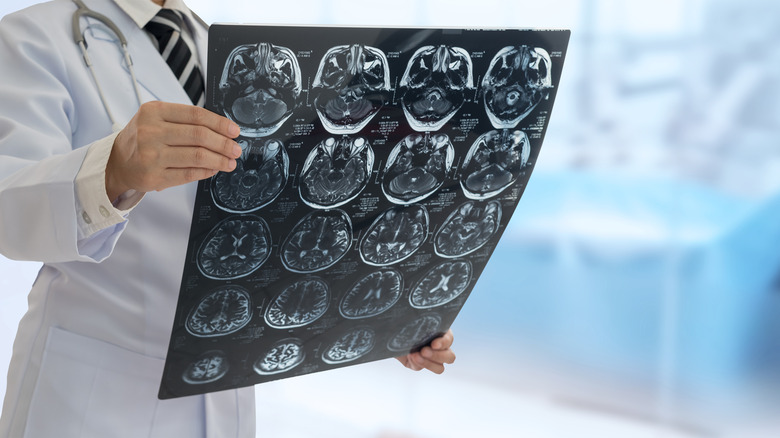Tension Headache Explained: Causes, Symptoms, And Treatments
Tension headaches aren't the worst thing that can happen to you — but let's face it, they're still a bummer. And part of what makes them so unpleasant is that they're often triggered by stress (via the Mayo Clinic). So chances are, your flaring tension headache is probably making an already unpleasant situation even worse.
But if you're susceptible to tension headaches, you might take some minor consolation in knowing you're not the only one. According to the Cleveland Clinic, as many as two out of three adults in the United States are thought to experience tension headaches — and this might be a low figure: A large number of cases go unreported, since most people power through their headaches without seeking medical help.
Fortunately for tension headache sufferers, most tension headaches are relatively short-lasting and easily treatable at home. And even better, you can take steps to reduce your chances of getting a tension headache in the first place. Let's take a deeper dive into the causes, symptoms, and treatments.
Don't confuse tension headaches with migraines
Not all headaches are created equal — or have the same causes. According to Penn Medicine, that pain you're experiencing might not be a tension headache: It could be a cluster headache, sinus headache, or migraine. So if you're susceptible to headaches and want to take action to reduce their frequency and severity, it's important to understand what kind of headaches you have so you'll be better equipped to counteract or prevent them from starting in the first place.
You can recognize a tension headache by its distinctive pain pattern: Unlike other headache types, the pain from tension headaches generally radiates over both sides of the head, from back to front. The pain will be steady, rather than throbbing, and typically mild to moderate in intensity. Sufferers often describe it as an unpleasant sensation of having one's head tightly squeezed (via the Cleveland Clinic).
In contrast, cluster headaches are more intense and tend to occur in a sequence, while sinus headaches result in a pressure and pain behind the eyes, nose, and cheeks. Finally, migraines, which Penn Medicine considers a neurological condition of which headaches are just one symptom, may involve not just an intense, throbbing headache, but nausea, sensitivity to light and sound, blurred vision, and extreme fatigue.
Recognize the different types of tension headaches
Different people may experience tension headaches in different ways. According to the Mayo Clinic, tension headaches fall into two basic types: episodic and chronic. As their names imply, these types refer to the relative frequency and duration of the headaches: Episodic tension headaches can last from 30 minutes up to a week, and occur less than 15 days a month for at least three months. In contrast, chronic tension headaches are even more frequent and persistent, occurring more than 15 days a month and typically lasting longer.
Episodic and chronic tension headaches not only differ in length and intensity, but tend to target different populations. Per Fenichel's Clinical Pediatric Neurology (via Science Direct), episodic tension headaches are widespread and common across all ages and genders. In contrast, chronic tension headaches affect only 4% of the population and are more common among women, who comprise 65% of all sufferers (per BMJ Clinical Evidence). It's worth noting that episodic tension headaches can evolve into chronic tension headaches, and overuse of medications such as ibuprofen can trigger chronic headaches as well as reduce the drug's effectiveness — so if you're head is aching, use painkillers prudently and follow the instructions on the label.
The exact causes of tension headaches are still unknown
While tension headaches are common and typically associated with stress (per the Mayo Clinic), the exact physical mechanism that causes them is not well understood. While they were formerly thought to be caused by muscle contractions in the neck, face, and scalp, recent research has found this not to be the case. "But new tests that measure muscle tension show that the muscles of people with tension headaches aren't any tighter. Newer theories suggest tension headaches are caused by changes in brain chemicals called neurotransmitters (including serotonin), similar to what happens with a migraine" (via Mount Sinai Health System).
Other theories have since emerged for the underlying mechanism behind tension headaches. One such theory (per the Mayo Clinic) is that people who experience tension headaches have heightened pain sensitivity — suggestive evidence for this is that muscle tenderness is a common symptom of tension headaches.
Other factors that can contribute to tension headaches, according to Johns Hopkins Medicine, are genetics — tension headaches tend to run in families — along with the environment.
These common habits can trigger tension headaches
While the precise physical mechanisms causing tension headaches are still under debate, the external triggers that lead to them are well known to tension headache sufferers. And while emotional and physical stress are among the most common triggers (per Medline Plus), many other triggers are common behaviors and habits that you can actively control.
Holding your head stationary for prolonged periods of time (such as when doing needlework, looking through a microscope, or working on a computer) can trigger tension headaches in some people, as can sleeping with your neck in an unusual position, according to Medline Plus. Other common triggers include cold temperatures, jaw-clenching or teeth-grinding, eye strain and fatigue. If you regularly experience tension headaches, keep a headache diary to note when your headaches started and what you were doing when they flared up. This will enable you to pinpoint any controllable triggers for your headaches and work to mitigate them.
Your diet can also contribute to tension headaches
Other lifestyle choices — such as diet — can also be contributing factors to tension headaches. While a strong cup of coffee can be a satisfying way to start the day for some people, excessive caffeine can trigger tension headaches in others, according to Medline Plus. But if this is the case for you and you want to cut back on caffeine, be forewarned — caffeine withdrawal is another tension headache trigger.
And while many people consume alcohol to relax and reduce tension, it too has been found to be a trigger for tension headaches. According to the Abbycare Group, this is because alcohol is a diuretic and causes dehydration through increased urination — the loss of fluid in the body can cause brain cells to temporarily contract, resulting in headaches.
Certain foods, such as pickles and aged cheeses, are also thought to be headache triggers in some individuals, explains the Cleveland Clinic. However, only 20% of headache patients are estimated to be food sensitive, so it might make sense to look at other possible headache triggers first.
These medications can ease a tension headache
Tension headaches are no fun, but fortunately, most are treatable with over-the-counter medications you probably already have in your home. According to the Cleveland Clinic, pain relievers such as acetaminophen (Tylenol), aspirin, ibuprofen (Advil and Motrin), and naproxen sodium (Aleve) are effective treatments for occasional tension headaches. If you have more severe or chronic tension headaches and have found these solutions ineffective, your doctor may prescribe another medication, such as amitriptyline (Elavil) which is an antidepressant.
While over-the-counter pain relievers are safe when used correctly, overuse can not only make your headaches worse, but cause additional problems. For instance, using these medications more than twice a week can result in your body building up a tolerance to them, making them less effective for pain relief. Overuse can also lead to rebound headaches if you try to reduce your intake. And in addition, overuse of over-the-counter painkillers increases your risk of side effects, such as stomach pain and ulcers. So if you do turn to over-the-counter painkillers for your tension headaches, use the smallest dose that works for you.
You can also relieve tension headaches without medication
Per Medline Plus, just as some of the triggers for tension headaches (such as working with one's head in the same position for prolonged periods) are behavioral, so are some effective tactics for relieving them. As the Cleveland Clinic notes, for headache sufferers whose headaches are triggered by stress, techniques that train the brain to recognize and better respond to stress — such as biofeedback, meditation and breathing exercises, and counseling — can relieve headaches and even prevent them from starting in the first place.
Other non-medical treatments can also offer relief for tension headaches. According to Medline Plus, massage is always a good tension reliever, so it can help alleviate tension headaches. Acupuncture has also been found to be an effective tension headache treatment for some people, though the mechanisms by which it works are not fully understood (per the Cochrane Database of Systematic Reviews). Finally, hot or cold compresses — whichever feels better to you — are another safe way to help relieve tension headaches.
Tension headaches could be a sign of other problems
While most tension headaches are mild, easily treatable, and don't cause other brain disorders, long-lasting chronic tension headaches can seriously impact your quality of life, not only resulting in pain and discomfort but preventing you from working or carrying out other needed tasks, according to the Cleveland Clinic. In addition, in some cases tension headaches can be a sign of another, more serious disorder, such as thyroid disease, a tumor, or migraine condition. And sadly, you can have a migraine and a tension headache simultaneously (via Healthline).
However, this does not mean you should panic at the onset of every tension headache — if you've experienced occasional tension headaches for a while, you generally have no need to worry. But if your headaches suddenly start to get worse or more frequent, or if you've never had tension headaches but start experiencing them after the age of 50, you should seek medical help (per the Cleveland Clinic).
Here's when to seek medical help for a tension headache
For most people, tension headaches are nothing more than a minor annoyance, according to the Cleveland Clinic. Because they are typically short-lasting and easily and safely treated at home, they generally don't require medical attention. Indeed, living with tension headaches is so common that they often go unreported, so some researchers suspect their prevalence may be underestimated.
This doesn't mean, however, that frequent tension headaches should be ignored. The Mayo Clinic advises that if your headaches are frequent and severe enough that you need to take pain relievers more than twice a week, you should seek medical help. Similarly, if your headaches get worse or start to feel noticeably different, this could indicate an underlying condition, such as an aneurysm — so get checked out if you notice this happening to you.
Finally, sudden severe headaches or headaches accompanied by a stiff neck, fever, mental confusion, numbness, or speech problems could indicate a serious problem and require emergency care.
There's no single test for tension headaches
While tension headaches are common, they're not the same for all who experience them, according to the Mayo Clinic – and while their exact causes are unknown, different factors can trigger them in different people (via Medline Plus). Similarly, no single medical test exists to identify tension headaches. If your headaches are severe enough for you to seek medical help, your doctor will first talk to you to understand your symptoms before taking any further measures (per Johns Hopkins Medicine).
According to Johns Hopkins Medicine, diagnoses of tension headaches are based on each patient's symptoms. During your exam, your doctor will ask detailed questions about the frequency and nature of your headaches, such as the times they commonly occur, where they are located, how long they last, and whether moving or changing positions affects them. Your doctor may also ask about your lifestyle (for example, about your stress levels and sleep patterns).
Basic tension headaches can be diagnosed on the basis of your answers to these questions, but if your doctor suspects an underlying condition causing your headaches, further tests — such as sinus x-rays, blood tests, or MRIs — may be recommended.
Simple lifestyle changes can help prevent tension headaches
The good news if you're suffering from tension headaches is that you can take some control over your situation. According to Johns Hopkins Medicine, a few commonsense lifestyle changes can not only help you avoid tension headaches, but improve your overall health and quality of life.
First, you should identify any regular triggers for your headaches so you can learn to avoid them. Second, adopting more healthful living habits can reduce your chances of a headache. These practices include getting enough sleep in a quiet, dark environment and staying on a regular sleep schedule, eating regularly scheduled and healthful meals, exercising consistently for at least 30 minutes a day, and engaging in stress relief practices such as meditation or yoga. In addition, the Mayo Clinic recommends drinking plenty of water and avoiding excess caffeine.
The Mayo Clinic also notes that reducing your chance of tension headaches is yet another good reason to quit smoking, since nicotine decreases blood flow to your brain, which can trigger headaches.












